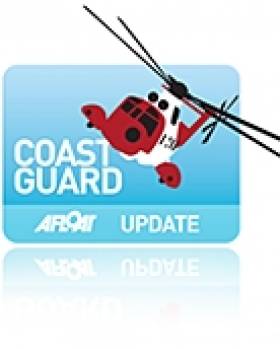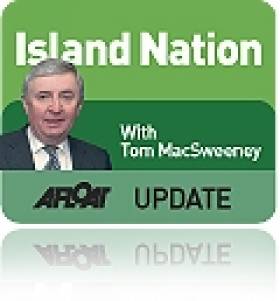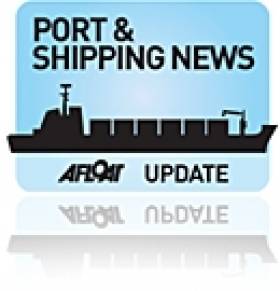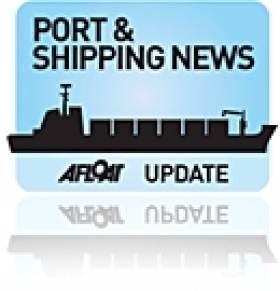Displaying items by tag: Noel Dempsey
Marine Minister to Have Air-Sea Rescue Remit
Minister for the Marine Simon Coveney will have the remit for air and sea search and rescue services, it has emerged.
The Irish Times reports that the move is part of a promised consolidation of maritime functions under the new programme for Government.
Responsibilty for the Irish Coast Guard will however remain with Minister for Transport Leo Varadkar until an official transfer which is expected in the next few weeks.
Meanwhile, fellow Fine Gael TD and Minister of State for NewEra, Fergus O'Dowd, intends to push for a review of the State's €500m contract for search and rescue services with CHC Ireland.
O’Dowd said there were “significant questions to answer” over the deal signed by former Transport Minister Noel Dempsey last year.
The Irish Times has more on the story HERE.
Marine is Back
It is a reminder which I hope that the media in general will note and that his tile of Marine will be used as often as agriculture is. The general media has been notorious, in my view, for disregarding the marine sector unless there is disaster, emergency or controversy involved.
The return of the title 'Marine' to a Government Department is, to put it bluntly, a kick-in-the-ass which civil servants needed. It was a betrayal of this island nation's heritage when those in charge of the former Department of Transport held a meeting which decided to remove the title marine from the Department's name, even though the then Minister had been assigned the role of Minister for Transport and Marine. The man in charge of that Department, Noel Dempsey, did not demonstrate a lot of interest in the marine, being more noted for trying to shut down the coastal radio stations at Valentia and Malin, where he was beaten off by public opposition, which also happened when he tried to remove 24-hour rescue helicopter service in the south-east and for his introduction of laws which criminalised fishermen.
Hopefully, the restoration of 'Marine' to a Department's name will be the harbinger of better things for the marine sphere.
I have heard some disappointment expressed that the marine is not a department on its own, but what the Fine Gael and subsequently Coalition Programme for Government agreed by Enda Kenny and Eamon Gilmore said was: "Marine responsibilities will be merged under one Department, for better co-ordination in policy delivery."
They have been, though some of the finer detail remains to be seen, such as will the ports be moved away from Transport, to where port companies and commercial interests originally campaigned to have them moved? And how will the split of marine tourism work between Agriculture and Marine and the separate tourism department? A similar issue may arise in regard to sailing and sport, but it seems to me a positive step that the disregard which Fianna Fáil and the Greens showed for the marine sector is being changed.
It was also right to end a separate department for defence. With a small army and navy, smaller than the marine sector, it was nonsense that it should have been a department of its own.
Let us therefore, hope for the future and take a positive view of the change as being for the better.
New Life for Bremore Port Development
Drogheda's port company has redrafted its plan to develop a €300 million deepwater harbour in north Dublin.
The semi-State Drogheda Port Company previously failed to get approval from then Transport Minister Noel Dempsey when it first submitted proposals for the port at Bremore, near Balbriggan, in 2009.
The Sunday Business Post reports that the project would require a Ministerial Order to sanction the extension of Drogheda port's boundaries into Co Dublin under the Harbours (Amendment) Act 2009.
Previously any such extension would have been "legally problematic", in the words of Attorney General Paul Gallagher.
No planning application has yet been made, but partners in the venture are reported to be making preparations.
A public consultation on the previous proposals was conducted in September 2009.
International Maritime Regulators Qualify Irish Registered Ships as 'Low Risk' for First Time
The Minister for Transport Mr Noel Dempsey T.D today welcomed the confirmation from the Paris Memorandum of Understanding (PMoU), on port state control that Irish flagged ships can qualify for the first time as "low risk ships" under a new international maritime inspection regime introduced from 1 January 2011.
Speaking this afternoon Minister Dempsey said; "This new low risk status will deliver very real benefits to Irish registered ships in the international maritime transport sector. It will mean significantly less inspections and greater advantages in the charter market for Irish flagged ships. It will also have the impact of greatly enhancing the maritime reputation of Ireland and will save seafarers time and money. I am pleased that the international maritime regulators have recognised the quality of Irish registered ships and their associated companies. This status was gained as a result of very significant efforts on the part of the Irish shipping industry, Irish seafarers and by officials in the Department of Transport."
Minister Dempsey added; "Last year Ireland jumped 11 places in the International Maritime Organisation's "White List" of international shipping nations to 8th position. This put us in the top tier of maritime countries worldwide. The confirmation now that Irish registered ships are classed as "low risk" further enhances our international reputation."
Under a new inspection regime international ships are now classed as low risk, standard risk or high-risk. This classification will result in ships being targeted for safety inspections. Low risk ships will be rewarded with longer inspection intervals of up to three years. Standard risk ships will be inspected every year and high risk ships will be subject to expanded inspections every 6 months. Ships with 3 or more detentions will be banned from entering ports for a minimum period of 3 months. Ships with consistently poor performance will be permanently banned.
In order for a ship to be regarded as "low risk" a key criterion is that it must fly the flag of a "White Listed" State and that the flag State must also have completed the International Maritime Organization (IMO) audit. During 2010 Ireland moved up to eight position on the "White List" and Ireland has now successfully completed the IMO Audit. These developments together have now allowed Irish flagged ships to be classified as "low risk" for the first time. By 1 January 2011 only 22 States out of a possible 169 States have attained this status worldwide.
On 1 January 2011 Ireland also implemented THETIS - the new international information system that manages ship inspections. THETIS is linked into SafeSeasIreland and since 1 January 2011 all ships have a statutory obligation to report their pre-arrival information into SafeSeasIreland. The Minister has now signed the new regulations SI No. 656 of 2010 giving effect to the new inspection regime.



























































